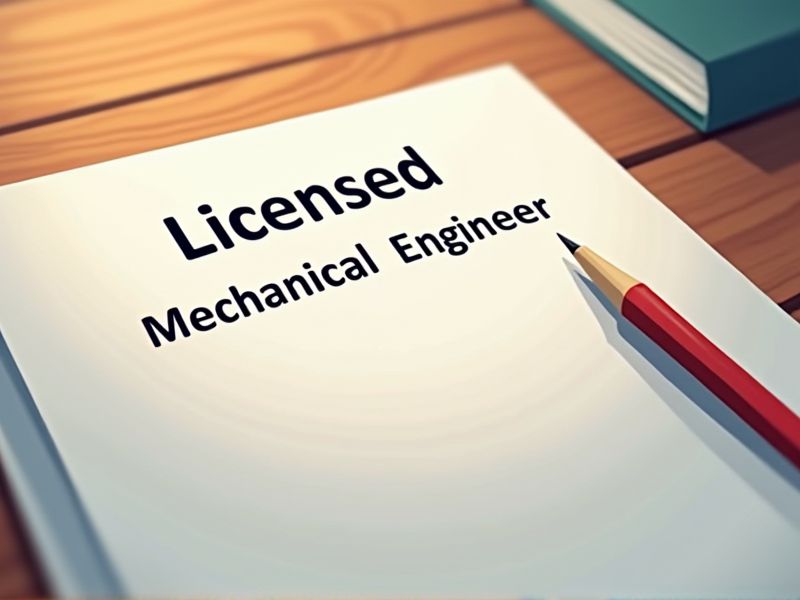
Licensed Mechanical Engineers require specific certifications to enhance their expertise and remain competitive in the field. These certifications reflect a commitment to ongoing education and adaptation to new technologies. With industries constantly evolving, these credentials can also increase job opportunities and earning potential. Some important certifications you may need as a Licensed Mechanical Engineer include the Professional Engineer (PE) license, HVAC certifications, or specialized credentials in areas like Six Sigma or Lean Manufacturing.
Fundamentals of Engineering (FE) Certification
The Fundamentals of Engineering (FE) Certification serves as the initial step toward obtaining a Professional Engineer (PE) license, which is often required for career advancement in mechanical engineering roles. Passing the FE exam verifies a candidate's competency in essential engineering principles, ensuring adherence to industry standards. Employers frequently consider the FE Certification as evidence of a candidate's commitment to the engineering profession, enhancing job prospects. The certification provides a competitive edge by differentiating certified engineers in a crowded job market.
Principles and Practice of Engineering (PE) License
Obtaining a Principles and Practice of Engineering (PE) License is crucial because it legally allows mechanical engineers to offer their services directly to the public. It enhances trustworthiness, ensuring clients and employers rely on engineers who meet defined standards of competence. The PE License also opens up advanced career opportunities and positions of leadership requiring a sealed document or project approval. In many states, the license is a regulatory requirement for engineers who want to independently sign off on design plans, ensuring adherence to safety and ethical standards.
Certified Energy Manager (CEM)
A Certified Energy Manager (CEM) enhances a licensed mechanical engineer's expertise by providing specialized knowledge in energy efficiency and sustainability. Possessing a CEM designation signals a commitment to reducing operational costs through optimized energy use. The CEM credential offers a competitive edge in industry settings where energy conservation is increasingly prioritized. Employers often seek engineers with a CEM to lead initiatives that meet regulatory and environmental standards.
LEED Accredited Professional (LEED AP)
Achieving LEED Accredited Professional (LEED AP) status allows a Licensed Mechanical Engineer to demonstrate expertise in sustainable building practices, which is increasingly important as client demand for environmentally friendly solutions grows. The knowledge gained through LEED accreditation enhances an engineer's ability to design systems that optimize energy efficiency, aligning with the global push towards reducing carbon footprints. LEED AP credentials can lead to new project opportunities, as many clients and firms prioritize sustainable practices in their bids and contracts. In a competitive job market, having LEED AP status can set an engineer apart by showcasing their commitment to environmental stewardship and advanced industry standards.
Six Sigma Green Belt Certification
Obtaining a Six Sigma Green Belt Certification equips licensed mechanical engineers with process improvement skills, enhancing their ability to optimize manufacturing systems. The certification provides tools for data analysis, resulting in reduced defects and increased operational efficiency. Employers recognize Six Sigma as a mark of quality expertise, leading to competitive career advancement. For engineers, integrating Six Sigma methodologies aligns with an industry trend towards precision and continuous improvement.
Certified Maintenance & Reliability Professional (CMRP)
The Certified Maintenance & Reliability Professional (CMRP) certification enhances a licensed mechanical engineer's credibility by validating their expertise in maintenance and reliability practices. With this certification, engineers are better equipped to develop and implement efficient maintenance strategies that reduce operational costs. The CMRP credential also increases career advancement opportunities by distinguishing engineers in a competitive job market. This certification helps in standardizing practices and improving overall system reliability within engineering projects.
Project Management Professional (PMP)
Increased project complexity demands that licensed mechanical engineers possess management skills, and a PMP certification equips them with essential project management methods. The integration of engineering expertise with PMP training enhances project execution, improving timelines and resource management. Employers often favor engineers with PMP certification, viewing them as more capable of leading multifaceted initiatives. This blend of engineering knowledge and project management expertise can reduce costs and increase project efficiency, meeting industry standards effectively.
Certified Quality Engineer (CQE)
A Licensed Mechanical Engineer can benefit from having a Certified Quality Engineer (CQE) certification to enhance skills in quality control and process improvement, leading to more efficient project outcomes. The CQE certification provides knowledge in statistical analysis and problem-solving methodologies, essential for minimizing design flaws and optimizing production processes. Engineers with both credentials are often more competitive in the job market because they can ensure product reliability and compliance with industry standards. The dual expertise supports increased client trust and opens opportunities for leadership roles within engineering projects.
HVAC Design Professional Certification
HVAC Design Professional Certification enhances a licensed mechanical engineer's skills, making them more proficient in designing complex HVAC systems. The certification demonstrates a specialized understanding of industry standards and energy-efficient practices, which can lead to better project outcomes. It increases professional credibility, helping engineers gain trust from clients and employers. Possessing the certification can also open up higher-level job opportunities and potentially lead to increased earnings.
ASME Certification in Pressure Vessel Engineering
ASME Certification in Pressure Vessel Engineering enhances a licensed mechanical engineer's credibility by adhering to recognized safety and design standards. Certification ensures compliance with stringent regulations, reducing the risk of equipment failure and accidents. Employers and clients often prefer certified professionals, as it demonstrates expertise and commitment to quality. Certification can open up more career opportunities and projects, given the industry's demand for highly skilled engineers in specialized areas.
Summary
You, as a Licensed Mechanical Engineer obtaining additional certifications, can expect enhanced career opportunities due to the expanded skill set. This could lead to an increase in your marketability and potential for higher earnings. Employers may view you as a more valuable asset due to your diversified expertise. With certifications, you might also gain access to cutting-edge industry knowledge, keeping you ahead in your field.
